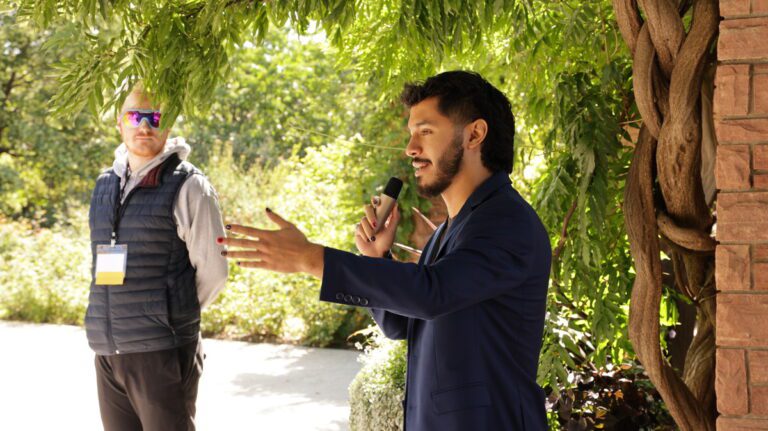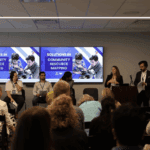The Switchboard Confluence event this fall brought together technology innovators and refugee resettlement professionals to reimagine newcomer support through emerging technologies. This blog post recaps some of the Confluence’s highlights—exploring how ethical tech integration, from artificial intelligence (AI) storytelling initiatives to virtual case management solutions, is transforming refugee services. This blog also includes video links for the several Confluence sessions that were recorded. If you want to explore how emerging technologies can enhance your programs, submit a technical assistance request to our Emerging Technology team.
Innovation in Resettlement
In the refugee resettlement community, innovation is sometimes seen as unrealistic, or even impossible, given the many challenges we face. But the Switchboard Confluence event, hosted this September in partnership with the University of Utah’s College of Architecture and Planning’s Department of Multi-Disciplinary Design, reminded us that resettlement and innovation can go hand in hand. The Confluence brought together refugee resettlement professionals, virtual reality (VR) developers, AI researchers, students, professors, and humanitarian leaders to reimagine how cutting-edge technology could transform support for refugees and newcomers in the U.S.
The innovations that emerged from this unique gathering were far from theoretical. Picture refugees practicing their first U.S. doctor’s visit through VR headsets, or AI-powered digital assistants helping caseworkers provide 24/7 support in newcomers’ native languages. Over two days of intensive sessions, more than 100 participants—from university researches to key resettlement partners—harnessed emerging technology to imagine a more humane, efficient, and empowering refugee resettlement process.

From Vision to Action: Setting the Stage
The gathering opened with a challenge from leaders at the intersection of humanitarian work and innovation. The International Rescue Committee’s (IRC) Senior Vice President Hans Van de Weerd and the University of Utah’s Dean Arnab Chakraborty to champion a powerful vision: technological tools developed not just for refugee communities, but with them. Leaders from the field opened day two with similar enthusiasm for integrating new technology into resettlement work and embracing new resettlement models, while also expressing a passion for health humanities: the application of insights from the liberal arts to transform health, education, and well-being.
This philosophy of co-creation became the event’s north star, with emcees Krysti Nellermoe—Switchboard’s Training Officer of Emerging Technology—and Milad Mozari— the University of Utah’s Assistant Professor of Multi-Disciplinary Design—embracing what they called “productive chaos”: the messy, iterative process where real innovation thrives. Their message was clear: the best solutions emerge when we create space for everyone’s voices, especially those we aim to serve.
Event Components: Knowledge Exchange, Technology Playground, and Interactive Workshops
Knowledge Exchange
Bridging Borders
At Arizona State University’s Resilient Visions CoLab, the Bridging Borders initiative is redefining how we understand refugee experiences. Co-created with Afghan Hazara communities, this AI storytelling platform enables real-time conversations with digital avatars that share authentic displacement narratives. In an era of rising misinformation, the project captures the full complexity of refugee experiences—from heartbreak to hope—fostering genuine understanding of the varied, complex, and multi-dimensional pallette of emotions and chronicles.

Watch a recorded video of the Bridging Borders session
JIWE Studio
Former MIT fellow Max Musau founded JIWE Studio in Kenya to tell Africa’s untold stories through games. He discussed how he uses gamification and digital tools to foster learning outcomes, enhance knowledge, and support research initiatives. JIWE has created compelling interactive experiences around African history and culture since 2019. But in 2022, JIWE took on perhaps its most challenging project yet: bringing light to a form of slavery that most of the world doesn’t even know exists.
Gaming Against Slavery tackles the haunting reality of discrimination in Western Africa: a system where individuals are born into bondage simply because their ancestors were enslaved. Rather than shy away from this “elephant in the room,” as Max describes it, JIWE’s team partnered directly with communities in Mali to gather their stories into a mobile game that both educates and empowers.
Panel Discussion: Reimagining Resettlement Service Delivery
The question of how AI can transform refugee case management took center stage during an enriching panel on digital assistants, led by IRC’s Vice President for Research Analysis and Learning, Kristy Gladfelter. Together with IRC’s Chief Research and Innovation Officer, Jeannie Annan, panelists showcased models and prototypes that could revolutionize how we support newcomers. From AI-powered case management to newcomer social media influencer campaigns, the discussion illuminated how refugee services can evolve to meet tomorrow’s challenges while maintaining a human touch.

Panel Discussion: Whole Office Approach to Digital Access
Drawing from their own successes and setbacks, five panelists offered practical strategies for integrating digital literacy and access programs into existing initiatives—from securing leadership support to ensuring newcomers can access affordable technology and Internet. The experts shared vivid personal experiences of developing or restructuring digital programs step by step, all while engaging and empowering their communities. The panel also addressed how to measure and evaluate the effectiveness of different efforts, as well as the stages of development for individualized learning goals around technology.
Watch the panel discussion on the Whole Office Approach to Digital Access
Tech Playground

Visitors walked into a dimly lit, spacious room which served as the event’s interactive arcade, offering participants a hands-on learning experience through tech demos, installations, and immersive games. Exhibits featured prototypes and digital products developed through the co-creation method, including 360°videos; an immersive game designed to support community navigation; interactive AI tools like Synthesia (for AI-generated videos and avatars), Suno (for AI-generated music), and Midjourney (for AI-generated images based on written prompts); and extended reality (XR) applications for core resettlement services. Participants were introduced to VR experiences that immersed them in multiple scenarios—sitting in a classroom, visiting a pharmacy, and riding public transportation—which could reduce anxiety for newcomers entering new spaces in the U.S. for the first time.
Interactive Workshops
Interactive workshops brought theory into practice as participants tested emerging technology prototypes, engaged in mini-design sprints, and shared insights about co-creation.
Workshop 1: Small Models, Big Impact—Preserving Culture in the Age of AI
Facilitated by representatives from Arizona State University’s CoLab, this workshop focused on the implications of large language models (LLMs). Attendees participated in a game format using dice and flip cards to understand how language models can homogenize speech, thought, and culture. The exercise highlighted the importance of actively avoiding this diminishment and ensuring that we do not rely solely on algorithms and technology.
Watch the Gamification session
Workshop 2: Changing Figure of the Caseworker
Under the guidance of Social Impact Consultant and Subject Matter Expert Emmanuela Douyon, small groups evaluated digital assistants and AI tools, reimagining their potential to enhance both virtual and in-person case management for Haitian entrants.
The session culminated in “Shark Tank”-style pitches to representatives from ORR, PRM, and Haitian community experts. In just 45 minutes, teams developed remarkably diverse solutions: from Haitian influencer-led social media campaigns to Creole-language apps integrating virtual case management and XR technology. These rapid prototypes demonstrated technology’s potential to transform service delivery for traditionally underserved populations.

Workshop 3: Walk-and-Learn—Exploring Technology in Nature
To wrap up the event, participants took a short bus ride to the picturesque Red Butte Garden. Here, they joined small groups and rotated between three presentations, each featuring two speakers, from teams optimizing their work with resettlement agencies with emerging technologies. The speaking duos included:
- Design in Humanitarian Spaces: Campeon Ramirez, Switchboard’s Emerging Technologies Coordinator, and Jareth Kimball Archer, Digital Learning Innovation and Outreach at the University of Utah and Contracted VR Developer at Switchboard, discussed how to encourage creativity in resettlement program design.
- Technology Industry Partnerships: Senka Filipovic, IRC Associate Director for Gaming, International Philanthropy, and Partnerships, and Thomas Winkley, Unity Technical Marketing Advocate, Social Impact and Education, discussed practical approaches to technology partnership in the humanitarian sector.
- Switchboard Emerging Technology Intensive Technical Training: Heaven Tesfahiwet, Health and Wellness Coordinator with the IRC in Dallas, and Sierra Arlidge, Supervisor with the Refugees Northwest Foster Care program from Lutheran Community Services Northwest, presented on their technical assistance with Switchboard’s Emerging Technologies team. This included co-creating, filming, and producing 360° videos about integrating VR technology into service delivery.

Key Takeaways
The Switchboard Confluence event proved that innovation thrives at intersections: where resettlement expertise meets emerging technology, where client needs guide technological development, and where diverse perspectives combine to reshape what’s possible. By bringing together unlikely allies and embracing co-creation, the Confluence laid the groundwork for ongoing collaboration that promises to transform how we welcome and support newcomers. Most importantly, the gathering demonstrated how, when we put ethics and client voices at the center of innovation, technology becomes more than just a tool but a bridge to the communities we serve.
Ready to Transform Refugee Support through Technology?
Switchboard’s Emerging Technologies training team is here to help your organization harness the power of innovation. From VR integration to digital literacy programs, we provide hands-on technical assistance to help you reimagine refugee support. Submit a technical assistance request to explore how emerging technologies can enhance your resettlement programming.










